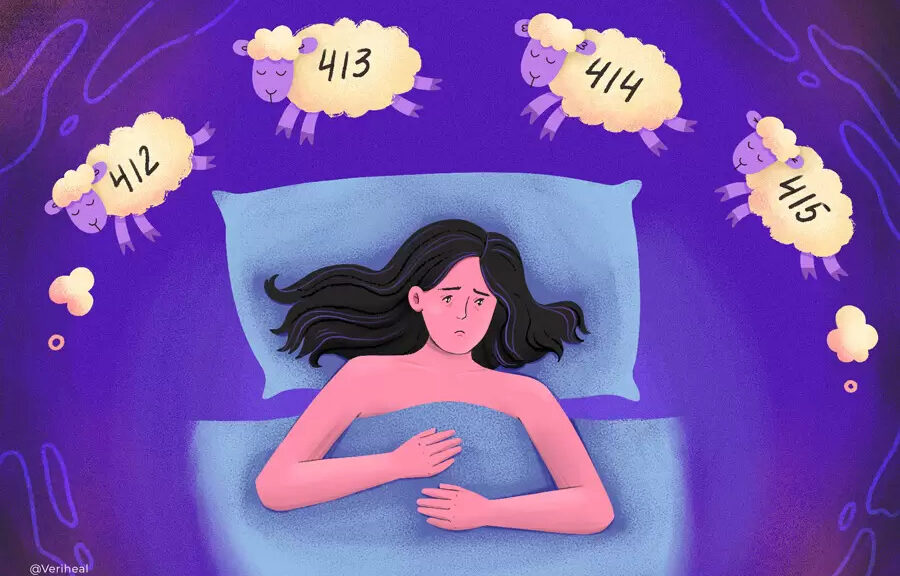
Understanding Insomnia: Causes, Symptoms, and Treatment Options
Introduction Insomnia, defined as difficulty falling asleep, staying asleep, or experiencing non-restorative sleep, is a common sleep disorder that affects millions of people worldwide. While a few sleepless nights are normal, chronic insomnia can have a significant impact on one’s quality of life, causing daytime fatigue, impaired cognitive function, and mood changes. Understanding the causes, symptoms, and treatment options for insomnia is critical to effectively managing the condition and improving overall well-being.
Causes Of Insomnia Insomnia can be caused by a variety of factors, including physiological, psychological, and environmental triggers. The following are some common causes of insomnia:
Anxiety and depression, as well as chronic stress, can disrupt sleep patterns, making it difficult to fall asleep or stay asleep all night.
Poor Sleep Hygiene: Irregular sleep schedules, excessive screen time before bed, and disruptive environmental factors such as noise and light can all disrupt the body’s natural sleep-wake cycle, leading to insomnia.
Medical Conditions: Chronic pain, asthma, arthritis, gastrointestinal disorders, and neurological conditions can all disrupt sleep and contribute to insomnia.
Medications and Substances: Certain medications, such as antidepressants, corticosteroids, and hypertension medications, can disrupt sleep. Additionally, caffeine, nicotine, and alcohol consumption close to bedtime can impair sleep quality.
Hormonal Changes: Hormonal fluctuations during menstruation, pregnancy, and menopause can interfere with women’s sleep patterns, causing insomnia symptoms.
Symptoms of insomnia Insomnia symptoms can vary from mild to severe, depending on the individual. Common symptoms include:
- Difficulty falling asleep despite being tired
- Symptoms may include frequent waking up during the night, difficulty falling asleep, and early awakenings.
- Daytime fatigue, irritability, and difficulty focusing.
- Reduced performance at work or school
- Mood disorders, such as anxiety and depression
- Physical symptoms include headaches, gastrointestinal discomfort, and muscle tension.
Chronic insomnia can have a significant impact on one’s physical and mental health, increasing the risk of cardiovascular disease, obesity, diabetes, and mental health disorders if not addressed.
Treatment Options For Insomnia Insomnia is typically treated with a combination of lifestyle changes, behavioral therapy, and, in some cases, medications. Here are some effective treatments for insomnia:
Sleep Hygiene Practices: Sticking to a consistent sleep schedule, creating a comfortable sleeping environment, and avoiding stimulating activities before bedtime can all help improve sleep quality and promote relaxation.
Cognitive behavioural therapy for insomnia (CBT-I): CBT-I is a structured, evidence-based therapy designed to identify and change negative thoughts and behaviors that contribute to insomnia. It helps people develop healthy sleeping habits and improve their sleep quality over time.
Relaxation Techniques: Progressive muscle relaxation, deep breathing exercises, meditation, and guided imagery can all help reduce stress and promote relaxation, making it easier to fall and stay asleep at night.
Stimulus Control Therapy: This therapy focuses on associating the bed and bedroom environment with sleep by limiting stimulating activities in bed and using the bed solely for sleep and intimacy. It helps to strengthen the connection between the bed and sleep, making it easier to fall asleep at night.
Prescription Medications: In some cases, healthcare providers may prescribe Lunesta 3 mg or antidepressants to alleviate insomnia symptoms. However, because of the risk of dependence and side effects, these medications are usually only prescribed for short periods of time.
Lifestyle Changes: Leading a healthy lifestyle that includes regular exercise, balanced nutrition, limiting caffeine and alcohol consumption, and effectively managing stress can all contribute to improved sleep quality and overall well-being.
Visit: Pills4cure
Conclusion
Insomnia is a common sleep disorder that, if not treated, can have serious consequences for one’s physical and mental well-being. Individuals can improve their sleep quality and manage insomnia by understanding the underlying causes, recognizing the symptoms, and implementing effective treatment strategies. There are several options for managing insomnia and restoring restful sleep patterns, including establishing healthy sleep hygiene practices and seeking professional help through cognitive-behavioral therapy. Prioritizing sleep and investing in strategies to promote relaxation and stress reduction can significantly improve overall health and well-being. If you’re experiencing insomnia, don’t be afraid to seek help from healthcare professionals who can help you develop personalized treatment plans based on your specific needs and preferences.